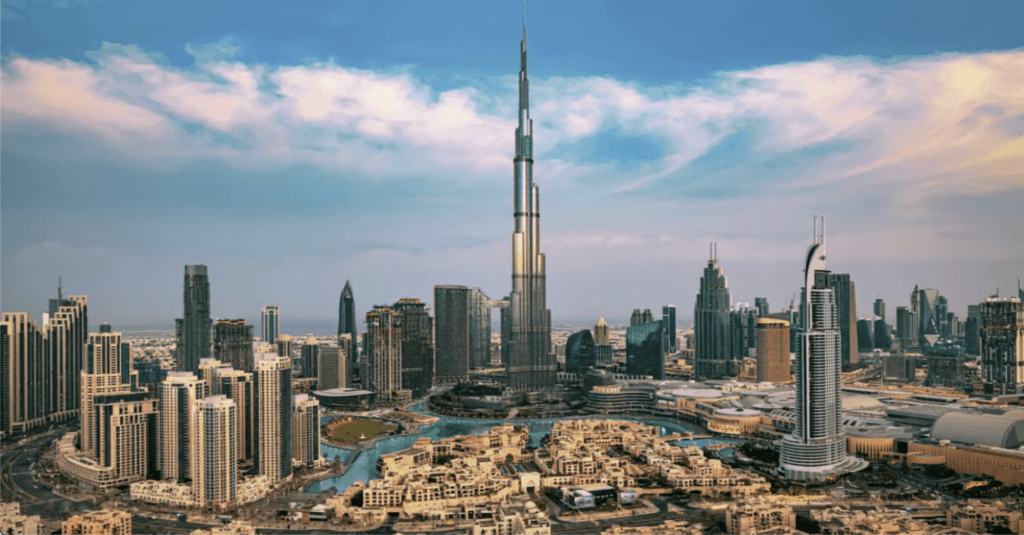How to Invest in Dubai Real Estate – Dubai is a global hub for real estate investment, drawing investors from all over the world due to its tax-free income, robust infrastructure, and rapidly growing economy. With its booming real estate sector and an increasing number of expats and tourists, Dubai offers excellent opportunities for both short-term and long-term investments.
In this comprehensive guide, we will walk you through everything you need to know about investing in Dubai real estate. From understanding the legal framework to finding the right property, we will cover all aspects of the investment process.
How to Invest in Dubai Real Estate: A Complete Guide for Investors

Table of Contents
- Why Invest in Dubai Real Estate?
- Types of Properties to Invest in Dubai
- Freehold vs Leasehold Properties
- Understanding the Dubai Real Estate Market
- Steps to Invest in Dubai Real Estate
- Financing Options for Real Estate Investments
- Key Areas to Invest in Dubai
- Costs Involved in Real Estate Investment
- Maximizing ROI in Dubai Real Estate
- Conclusion: Is Dubai the Right Choice for Your Investment?
1. Why Invest in Dubai Real Estate?
Dubai’s real estate market is one of the most attractive in the world for investors. Below are some key reasons why you should consider investing in this market:
- No Income Tax: Dubai is known for its tax-free environment, which means there is no personal income tax or capital gains tax on real estate investments.
- High Rental Yields: Investors in Dubai can expect rental yields of around 6-9%, significantly higher than many other global markets.
- Growing Population: Dubai’s population continues to grow due to the influx of expatriates and tourists, driving demand for both residential and commercial properties.
- Booming Tourism Sector: Dubai is one of the world’s most popular tourist destinations, which means high demand for vacation rentals and hospitality investments.
- Strong Infrastructure: The city’s world-class infrastructure, transportation systems, and free zones for businesses make it an appealing place for property investment.
- Political Stability: The UAE enjoys political stability and a strong legal framework, making Dubai a safe investment destination.
Benefits of Investing in Dubai
- Capital Appreciation: Property values in Dubai have shown strong growth over the years, and with upcoming projects and continuous development, capital appreciation is likely to continue.
- Foreign Investor-Friendly: The government has introduced policies to encourage foreign investment, such as granting long-term visas for property owners and facilitating property purchases for non-residents.
2. Types of Properties to Invest in Dubai
When investing in Dubai real estate, it’s crucial to understand the different types of properties available. Here are the most common property types:
- Residential Properties: This includes apartments, villas, townhouses, and luxury penthouses. Residential properties are ideal for both long-term rentals and holiday rentals, catering to Dubai’s large expat community and tourist market.
- Commercial Properties: Investors can purchase office spaces, retail shops, and warehouses. These are typically rented out to businesses, providing a steady rental income.
- Mixed-Use Properties: These developments combine residential, retail, and office spaces in one project, offering a diversified investment opportunity.
- Off-Plan Properties: Off-plan properties are those that are still under construction. Investors can buy them at a lower price during the development stage and benefit from capital appreciation once the project is completed.
Your choice of property should align with your investment goals, whether you are looking for rental income, long-term appreciation, or a combination of both.
3. Freehold vs Leasehold Properties
When buying property in Dubai, it is essential to understand the difference between freehold and leasehold ownership.
Freehold
- Ownership: Freehold properties give you full ownership of both the property and the land it sits on.
- Eligibility: Foreigners can buy freehold properties in designated areas, which are referred to as freehold zones.
- Areas: Popular freehold areas include Downtown Dubai, Dubai Marina, Business Bay, Palm Jumeirah, and Jumeirah Lake Towers (JLT).
Leasehold
- Ownership: Leasehold properties grant ownership for a specific number of years, typically 99 years. Ownership of the land remains with the developer.
- Affordability: Leasehold properties are generally more affordable than freehold properties, making them an attractive option for budget-conscious investors.
Whether you opt for freehold or leasehold depends on your long-term investment goals and the type of property you are purchasing.
4. Understanding the Dubai Real Estate Market
Dubai’s real estate market is dynamic, and understanding its trends is crucial for successful investment. Here are some key insights into the market:
- Population Growth: Dubai’s population continues to rise, driven by expats, businesses, and tourism, which increases demand for both residential and commercial properties.
- Expo 2020 Legacy: The global event helped boost property demand in certain areas, particularly around Dubai South, where many new projects were developed in preparation for Expo 2020.
- Economic Diversification: Dubai is no longer solely dependent on oil revenues; sectors such as tourism, real estate, technology, and finance are all growing rapidly.
- Property Supply: While there has been an increase in property supply in recent years, the demand remains robust, particularly in prime areas, due to a continuous influx of people and businesses.
Staying informed about market conditions is crucial for maximizing your investment returns.
5. Steps to Invest in Dubai Real Estate
Investing in Dubai real estate involves several steps. Here’s a step-by-step guide to ensure a successful investment:
Step 1: Define Your Investment Goals
Before you start, determine what you want from your investment. Are you looking for rental income, capital appreciation, or both? Your investment goals will influence your choice of property type and location.
Step 2: Choose the Right Location
Location is key in real estate investment. Choose areas that offer growth potential, high rental yields, and good infrastructure. Popular areas include Downtown Dubai, Business Bay, Dubai Marina, and Palm Jumeirah.
Step 3: Set Your Budget
Determine your budget, including the purchase price, transaction fees, and any additional costs. Make sure to leave room for maintenance and property management expenses, if applicable.
Step 4: Secure Financing (If Required)
If you need financing, explore mortgage options available for property investments in Dubai. Banks in Dubai typically offer financing for up to 80% of the property value for residents and 50-60% for non-residents.
Step 5: Find a Reputable Real Estate Agent
Work with a registered real estate agent who specializes in Dubai properties. They can help you find the right property, negotiate a fair price, and handle the transaction paperwork.
Step 6: Conduct Due Diligence
Before finalizing the purchase, conduct thorough due diligence on the property, including ownership verification, developer credentials, and any existing mortgages or liens on the property.
Step 7: Sign the Sale and Purchase Agreement (SPA)
Once you’ve selected a property and agreed on a price, you’ll need to sign a Sale and Purchase Agreement (SPA) with the seller. This legal document outlines the terms and conditions of the sale.
Step 8: Transfer Ownership
The final step is the property transfer at the Dubai Land Department (DLD). Both buyer and seller need to be present, and the DLD will facilitate the transfer of ownership once the transfer fees are paid.
6. Financing Options for Real Estate Investments
Investors have several financing options when purchasing real estate in Dubai:
- Bank Mortgages: Many banks offer mortgages to both residents and non-residents, though non-residents may be required to provide a higher down payment.
- Developer Financing: Some developers offer post-handover payment plans, allowing investors to pay in installments over several years after the property is completed.
- Cash Purchase: If you have the financial capacity, paying in cash is a quick and straightforward way to secure a property.
Before applying for financing, ensure you meet the eligibility requirements and understand the terms, including interest rates, repayment periods, and any associated fees.
7. Key Areas to Invest in Dubai
Dubai offers several prime areas for real estate investment, each with its own unique characteristics and advantages. Here are the top areas to consider:
1. Downtown Dubai
- Home to iconic landmarks like the Burj Khalifa and Dubai Mall, Downtown Dubai is one of the most sought-after locations for luxury apartments and high-end retail spaces.
2. Business Bay
- Business Bay is a central business district, ideal for office spaces and mixed-use developments. It is a prime location for investors seeking commercial properties.
3. Dubai Marina
- A popular area for both residents and tourists, Dubai Marina offers luxury waterfront apartments and a vibrant lifestyle, making it a top choice for investors seeking rental income.
4. Palm Jumeirah
- Known for its luxury villas and hotels, Palm Jumeirah is a unique man made island that attracts high end buyers and offers excellent capital appreciation.
5. Jumeirah Lake Towers (JLT)
- JLT is a freehold zone popular with businesses and expats, offering a mix of residential and commercial properties at competitive prices.
8. Costs Involved in Real Estate Investment
When investing in Dubai real estate, there are several costs to consider:
- Purchase Price: The property’s market price, which will depend on the type, location, and size of the property.
- Transfer Fees: The Dubai Land Department charges a 4% transfer fee on the property’s value.
- Registration Fees: A registration fee of AED 5,000 for properties valued under AED 500,000 or AED 10,000 for properties valued above AED 500,000 is payable to the Dubai Land Department.
- Agent Commission: Real estate agents typically charge a commission of 2-5% of the purchase price.
- Service Charges: Ongoing maintenance fees for common areas and facilities in residential developments. These vary depending on the property and location.
Understanding all associated costs is vital to calculating the return on your investment and ensuring profitability.
9. Maximizing ROI in Dubai Real Estate
To maximize your return on investment (ROI) in Dubai real estate, consider the following tips:
- Choose High-Demand Areas: Invest in areas with strong demand for both sales and rentals. Locations like Downtown Dubai and Dubai Marina consistently offer high rental yields.
- Invest in Off-Plan Properties: Off-plan properties often offer significant capital appreciation by the time they are completed, especially in well-located developments.
- Short-Term Rentals: With Dubai being a major tourist destination, short-term vacation rentals through platforms like Airbnb can generate higher returns than long-term leases.
- Renovation and Upgrades: Upgrading or renovating properties can increase their rental value and appeal to high-end tenants, resulting in better ROI.
10. Conclusion: Is Dubai the Right Choice for Your Investment?
Dubai’s real estate market presents immense opportunities for investors, offering high rental yields, tax-free income, and long-term capital appreciation. However, successful investment requires careful planning, thorough market research, and legal due diligence.
By following the steps outlined in this guide, you can make informed decisions and capitalize on the dynamic opportunities available in Dubai’s real estate market. For more insights and expert advice, you can also check out Bloomberg Real Estate.
FAQs
Q1: Can foreigners buy real estate in Dubai?
A1: Yes, foreigners can buy freehold properties in designated areas without any restrictions.
Q2: What are the most popular areas for real estate investment in Dubai?
A2: Downtown Dubai, Dubai Marina, Business Bay, and Palm Jumeirah are among the most popular areas for real estate investment.
Q3: What is the average rental yield in Dubai?
A3: Rental yields in Dubai range from 6-9%, depending on the location and property type.




